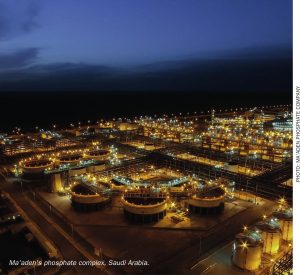
RCF plans to build $95m phosphoric acid unit at Thal
India's state-owned Rashtriya Chemicals and Fertilizers Ltd (RCF) has granted in-principle board approval to set up a new ...

India's state-owned Rashtriya Chemicals and Fertilizers Ltd (RCF) has granted in-principle board approval to set up a new ...

Syria’s Geological and Mineral Resources Authority has signed an agreement with Teryaq, a subsidiary of Serbia’s Exlixir Group, aimed at exporting 1.5 million t/a of phosphate by the end of 2026. The agreement marks a significant step in Syria’s efforts to expand international partnerships and optimise its mineral resources for economic gain. Elixir Group owns the largest phosphoric acid plant in Europe and operates three fertilizer plants in Serbia.

Flash floods in the Moroccan port city of Safi killed at least 37 people in December and injured many others, with knock on effects also likely to impact exports from phosphate producer OCP. Jorf Lasfar is the phosphate giant's main export hub for phosphate fertilizers and phosphoric acid, while Safi exports smaller volumes of phosphoric acid, TSP and animal feed products. Phosphate rock exports are largely concentrated at the port of Casablanca further north. OCP produces around 420,000 t/a triple superphosphate and 1.63 t/a phosphoric acid at Safi, as well as around 62,000 t/a dicalcium phosphate and 70,000 t/a monocalcium phosphate.

Iraq’s Ministry of Industry and Minerals confirmed on Wednesday its intention to proceed with the construction of a new phosphate plant in Al-Qaim district, Anbar province, to use 10 billion tonnes of phosphate reserves. The ministry also revealed the expected production volume and the total value of the project. Ministry spokesperson, Duha Al-Jubouri, told the Iraqi News Agency (INA): “This project aims to revive this sector after the near-total destruction of the phosphate plant due to terrorist operations.” She explained that “the project is being implemented in partnership with the private sector and is considered one of the mega-projects that reflects the significant potential Iraq possesses.”

Arianne Phosphate says that the government of Canada has approved contribution funding of up to C$735,000 to support the company’s ongoing work on processing phosphate rock and optimising its purified phosphoric acid (PPA) process. The funding, provided through Natural Resources Canada’s Critical Minerals Research, Development and Demonstration programme, is part of a C$80.3 million investment announced by Prime Minister Mark Carney to help build secure critical minerals supply chains in Canada. Phosphate was added to the Canadian critical mineral list in 2024. Arianne’s Lac à Paul project is the only fully permitted phosphate mine in the country. Arianne is now actively pursuing opportunities for the downstream production of PPA, a necessary ingredient for lithium-iron-phosphate batteries.

Madhya Bharat Agro Products has announced board approval for a major capacity expansion at its Dhule manufacturing facility. The expansion represents a comprehensive enhancement of the company's fertilizer production capabilities, including 330,000 t/a of diammonium phosphate and NPK fertilizer, a 66,000 t/a phosphoric acid plant, and a 396,000 t/a sulphuric acid plant. The expansion plan is part of a strategy of vertical integration in fertilizer production. The addition of phosphoric acid and sulphuric acid production capabilities will support the primary DAP/NPK manufacturing operations, creating operational synergies and potentially reducing input costs, according to the company.

Arianne Phosphates has signed a memorandum of understanding with Travertine Technologies Inc.for the production of purified phosphoric acid using Travertine’s proprietary process on high-purity phosphate concentrate from Arianne’s planned Lac à Paul project in Quebec Province.

Nutrien said in its 3Q results that it has initiated a review of strategic alternatives for its phosphate business, which could include reconfiguring operations, strategic partnerships or a potential sale. A final decision on the future of the phosphate business will be taken in 2026, according to the company .

John Carr, Lei Zhang & Yu Zheng of Syensqo review currently available decadmiation techniques, including the company’s ACCO-PHOS® technology.

Paradeep Phosphates Ltd (PPL) has announced a $400 million capacity expansion program, following its October 13th merger with Mangalore Chemicals & Fertilizers Limited (MCFL). This company says that the move aims to strengthen PPL's market position and enhance its production capabilities. The investment will involve increasing granulation capacity by 1.0 million t/a at the Paradeep site, as well as an additional 250,000 t/a of phosphoric acid and 750,000 t/a of sulphuric acid capacity at the company’s new Mangalore site. The expansion is expected to be completed within three years, according to PPL, and is expected to ensure 100% backward integration for fertilizer production, reduce import dependency, and enhance operational capabilities and profitability. low-contaminant phosphate concentrate that allows for easy conversion into purified phosphoric acid. The company has spent over C$100 million advancing the project and has received funding and investment from the Quebec Government.